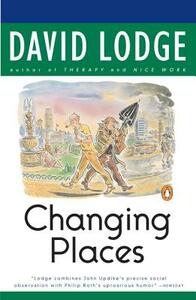Take a photo of a barcode or cover
Least favourite aspect/element of the book:
Can't think of anything that I straight out didn't like about this book...it's not as good as to deserve five stars, but the things it did were well done.
Favourite aspect/element of the book:
Beside the humor of this novel being right up my alley, I loved the structure of the book and how Lodge played around with different formats: each chapter (there are 6 in total) focuses on a particular part of the story by way of a different mode of narration: once the story is told to us through newspaper articles, ones through letters etc and at times the novel turns satirically towards itself by for instance lashing out at epistolary novels, postmodernism as I enjoy it the most. And the ending of the book was absolutely phenomenal and really turned it into a 4 rather than 3-star read.
Recommended for people who:
...are fascinated by campus or university life in general.
...are interested in the (small) cultural differences between the U.S. and the U.K.
...appreciate postmodern elements in literature.
Favourite quote:
"For me, if I'm honest, politics is background, news, almost entertainment. Something you switch on and off, like the TV. What I really worry about, what I can't switch off at will is, oh, sex, or dying or losing my hair. Private things. We're private people, aren't we, our generation? We make a clear distinction between private life and public life; and the important things, the things that make us happy or unhappy are private. Love is private. Property is private. Parts are private. That's why the young radicals call for fuckinh in the streets. It's not just a cheap shock-tactic. It's a serious revolutionary proposition. You know that Beatles' song, "Let's Do It In The Road"...?" (p. 231).
Can't think of anything that I straight out didn't like about this book...it's not as good as to deserve five stars, but the things it did were well done.
Favourite aspect/element of the book:
Beside the humor of this novel being right up my alley, I loved the structure of the book and how Lodge played around with different formats: each chapter (there are 6 in total) focuses on a particular part of the story by way of a different mode of narration: once the story is told to us through newspaper articles, ones through letters etc and at times the novel turns satirically towards itself by for instance lashing out at epistolary novels, postmodernism as I enjoy it the most. And the ending of the book was absolutely phenomenal and really turned it into a 4 rather than 3-star read.
Recommended for people who:
...are fascinated by campus or university life in general.
...are interested in the (small) cultural differences between the U.S. and the U.K.
...appreciate postmodern elements in literature.
Favourite quote:
"For me, if I'm honest, politics is background, news, almost entertainment. Something you switch on and off, like the TV. What I really worry about, what I can't switch off at will is, oh, sex, or dying or losing my hair. Private things. We're private people, aren't we, our generation? We make a clear distinction between private life and public life; and the important things, the things that make us happy or unhappy are private. Love is private. Property is private. Parts are private. That's why the young radicals call for fuckinh in the streets. It's not just a cheap shock-tactic. It's a serious revolutionary proposition. You know that Beatles' song, "Let's Do It In The Road"...?" (p. 231).
A must read! It's clever, witty, mimetic, and absolutely amazing.
I look forward to reading the next two in the trilogy.
Hope you enjoy it too!
I look forward to reading the next two in the trilogy.
Hope you enjoy it too!
Two English Literature university lecturers Philip (UK) and Morris (US) participate in a six-month exchange. There are funny moments, especially at the beginning, but it all got a bit tiresome and I skimmed the second half.
[b:Changing Places|69933|Changing Places|David Lodge|https://d202m5krfqbpi5.cloudfront.net/books/1390253085s/69933.jpg|1055072] by [a:David Lodge|6570|David Lodge|https://d202m5krfqbpi5.cloudfront.net/authors/1289704088p2/6570.jpg] is a funny and at times a cleverly written academic fiction.
I have a rather high threshold for comedy and this book made me laugh out loud numerous times. The humor is dry, clever, sometimes subtle, and sometimes self-deprecating.
Some of the later chapters, Lodge wrote in different styles. There is a epistolic chapter, one made of newspaper clippings, and the last chapter is written as a one act play. For me, the newspaper clippings were annoying, but the other styles worked well.
Maybe because of the last chapter, the whole story put me in mind of a Neil Simon-like play.
Very much recommended. I will definitely be reading [b:Small World|69930|Small World|David Lodge|https://d202m5krfqbpi5.cloudfront.net/books/1372769311s/69930.jpg|3359979], the next in the series soon.
I have a rather high threshold for comedy and this book made me laugh out loud numerous times. The humor is dry, clever, sometimes subtle, and sometimes self-deprecating.
Some of the later chapters, Lodge wrote in different styles. There is a epistolic chapter, one made of newspaper clippings, and the last chapter is written as a one act play. For me, the newspaper clippings were annoying, but the other styles worked well.
Maybe because of the last chapter, the whole story put me in mind of a Neil Simon-like play.
Very much recommended. I will definitely be reading [b:Small World|69930|Small World|David Lodge|https://d202m5krfqbpi5.cloudfront.net/books/1372769311s/69930.jpg|3359979], the next in the series soon.
a neat, tongue-in-cheek novel about academic life, the clash of cultures and the ridiculous chaos that naturally ensues. it's funny at times but never reaches the cathartic heights of storytelling I read and live for.
I read this on the train to New Jersey and back in January, and I'm sure my fellow passengers were looking at me strangely, because I was snorting and saying, "ha!" outloud. Maybe it's just being around academics again, but I found this novel extremely funny, and I probably will search out more Lodge based on it.
The idea is simple: two professors, one at a small college in England, the other at a huge conglomerate in California, switch places for an academic year. The English professor, who is barely scraping by, longs for the materialism of American society; the American professor, on the verge of divorce, is trying to get his wife to see past his infidelities and acknowledge his worth as a husband. But people are people all over, and while both professors undergo quite a bit of culture shock, and cause some culture shock in the academic societies that they become a part of, the real story here is that it is a small world after all (hmm, funny that, but Small World is the name of the sequel to this novel).
One of the best sections of this novel is the depiction of a game called Humiliation, wherein you must name a novel that you have not read, but that you expect everyone else at the table/party to have read. The idea is that by admitting not having read a canonical text (especially among Literature scholars) you will be humiliated. It's the kind of intellectual party game that Seinfeld watchers just can't join in on, because it assumes a sophistication. Either that, or it's just snobbery.
The other thing that raises this story above similar counterparts (including Kingsley Amis' Lucky Jim, which I liked, but not as much as this novel) is the clever way in which it shifts form within the story. For example, section three is done entirely epistolary, while the ending is written in screenplay format. The novel is also self-reflecting, in a wry sort of metafictional way. You know that you're reading a story, and the story knows that you are reading it, but instead of pressing the point as in some of the more aggressive post-modern works, it does some sly winks and nods in the general direction of the reader.
The idea is simple: two professors, one at a small college in England, the other at a huge conglomerate in California, switch places for an academic year. The English professor, who is barely scraping by, longs for the materialism of American society; the American professor, on the verge of divorce, is trying to get his wife to see past his infidelities and acknowledge his worth as a husband. But people are people all over, and while both professors undergo quite a bit of culture shock, and cause some culture shock in the academic societies that they become a part of, the real story here is that it is a small world after all (hmm, funny that, but Small World is the name of the sequel to this novel).
One of the best sections of this novel is the depiction of a game called Humiliation, wherein you must name a novel that you have not read, but that you expect everyone else at the table/party to have read. The idea is that by admitting not having read a canonical text (especially among Literature scholars) you will be humiliated. It's the kind of intellectual party game that Seinfeld watchers just can't join in on, because it assumes a sophistication. Either that, or it's just snobbery.
The other thing that raises this story above similar counterparts (including Kingsley Amis' Lucky Jim, which I liked, but not as much as this novel) is the clever way in which it shifts form within the story. For example, section three is done entirely epistolary, while the ending is written in screenplay format. The novel is also self-reflecting, in a wry sort of metafictional way. You know that you're reading a story, and the story knows that you are reading it, but instead of pressing the point as in some of the more aggressive post-modern works, it does some sly winks and nods in the general direction of the reader.
“Life was transparent, literature opaque. Life was open, literature a closed system. Life was composed of things, literature of words. Life was what it appeared to be: if you were afraid your plane would crash it was about death, if you were trying to get a girl into bed it was about sex. Literature was never about what it appeared to be about"
So this is one of the weirdest books I've read in terms of writing and structure. The plot is very simple: an american professor and an English professor change places and, for six months, they have to teach in each other's universities. Yet, the things that happened were so crazy. It might be because it was 1969 and it followed the hippie movement, women's liberation, revolution in a time of war for USA, while other people "enjoyed" life in a little town in England. When I tell you it was crazy, I'm not lying. Guys, there was a hippie orgy where everybody was super high. Beautiful, what can I say.
Also, the crazy things might also be because it was comically stereotypical, that really sparked my attention. It was everybody living in a mould and then the author took the job of slowly desconstructing them and form them again, but without a mould.
Now, in the matter of structure. The book is divided in six parts and each part is told in a different narrative style. I can tell why it's one of my sister's favourite books: I bet she could write a thousand pages essay all about this novel. The ending was gorgeous, one of the best endings I've ever read.
I mean, the plot per se wasn't that captivating for me, I didn't care too much for the main conflict. But the topics that the book touched along the way and a lot of the side characters were amazing. It didn't interest me that much until the second part of the novel to be honest, until like, the third part where it started to pick up.
But the book was crazy good. It was so funny, I laughed out loud so many times, it had a satirical and ironic humour that I really really liked. I think humour used this way should be an art form.
So this is one of the weirdest books I've read in terms of writing and structure. The plot is very simple: an american professor and an English professor change places and, for six months, they have to teach in each other's universities. Yet, the things that happened were so crazy. It might be because it was 1969 and it followed the hippie movement, women's liberation, revolution in a time of war for USA, while other people "enjoyed" life in a little town in England. When I tell you it was crazy, I'm not lying. Guys, there was a hippie orgy where everybody was super high. Beautiful, what can I say.
Also, the crazy things might also be because it was comically stereotypical, that really sparked my attention. It was everybody living in a mould and then the author took the job of slowly desconstructing them and form them again, but without a mould.
Now, in the matter of structure. The book is divided in six parts and each part is told in a different narrative style. I can tell why it's one of my sister's favourite books: I bet she could write a thousand pages essay all about this novel. The ending was gorgeous, one of the best endings I've ever read.
I mean, the plot per se wasn't that captivating for me, I didn't care too much for the main conflict. But the topics that the book touched along the way and a lot of the side characters were amazing. It didn't interest me that much until the second part of the novel to be honest, until like, the third part where it started to pick up.
But the book was crazy good. It was so funny, I laughed out loud so many times, it had a satirical and ironic humour that I really really liked. I think humour used this way should be an art form.
If you like laughing at academia, differences between US and UK universities, laughing at annoying things happening to pretentious people, satire of modern life and politics, laughing at Jane Austen conspiracy theories... then you will like this book. As I like all of these things, I thought it was hilarious!



